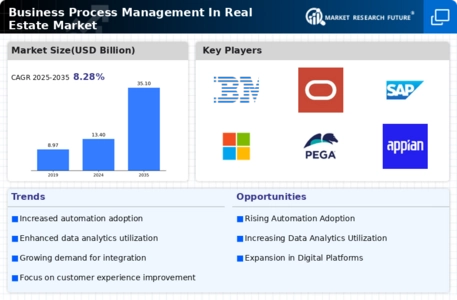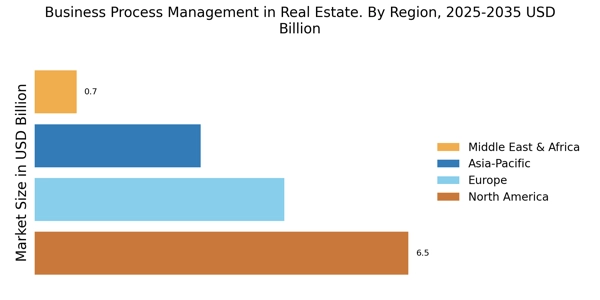Market Competition
Intensifying market competition is a significant driver in the Business Process Management In Real Estate Market. As new entrants emerge and existing firms expand their offerings, the competitive landscape is becoming increasingly crowded. This competition compels firms to streamline their processes and enhance service delivery to maintain market share. Data suggests that companies that invest in process optimization can achieve up to a 20% reduction in operational costs. Additionally, firms are exploring innovative strategies, such as partnerships and collaborations, to differentiate themselves. In this environment, agility and responsiveness to market changes are essential for firms aiming to thrive.
Regulatory Compliance
Regulatory compliance remains a critical driver in the Business Process Management In Real Estate Market. As governments worldwide implement stricter regulations regarding property transactions, data privacy, and environmental standards, real estate firms must adapt their processes accordingly. The compliance landscape is complex, with various laws governing different aspects of real estate operations. For example, the implementation of the General Data Protection Regulation (GDPR) has necessitated changes in how firms handle customer data. Firms that proactively invest in compliance management systems are likely to mitigate risks and avoid costly penalties. This focus on compliance not only enhances operational integrity but also builds trust with clients, which is essential in a competitive market.
Technological Advancements
The Business Process Management in Real Estate. is currently experiencing a surge in technological advancements. Innovations such as artificial intelligence, machine learning, and blockchain are transforming traditional processes. For instance, AI-driven analytics tools are enabling real estate firms to predict market trends with greater accuracy. According to recent data, the adoption of these technologies has led to a 30% increase in operational efficiency for many firms. Furthermore, the integration of blockchain technology is enhancing transparency in transactions, thereby reducing fraud risks. As these technologies continue to evolve, they are likely to redefine the operational landscape of the industry, making it imperative for firms to adapt swiftly to remain competitive.
Customer-Centric Approaches
The shift towards customer-centric approaches is reshaping the Business Process Management In Real Estate Market. Real estate firms are increasingly recognizing the importance of understanding client needs and preferences. This trend is evidenced by the rise of personalized marketing strategies and tailored service offerings. Data indicates that companies adopting customer-centric models have seen a 25% increase in client satisfaction rates. By leveraging customer feedback and data analytics, firms can refine their processes to enhance the overall client experience. This focus on the customer not only drives loyalty but also fosters long-term relationships, which are crucial for sustained success in the industry.
Sustainability and Green Practices
Sustainability and green practices are gaining traction as vital drivers in the Business Process Management In Real Estate Market. With growing awareness of environmental issues, real estate firms are increasingly adopting sustainable practices in their operations. This includes energy-efficient building designs, waste reduction initiatives, and sustainable sourcing of materials. Data indicates that properties with green certifications can command a premium of up to 15% in rental prices. As consumers become more environmentally conscious, firms that prioritize sustainability are likely to enhance their brand reputation and attract a broader client base. This trend not only aligns with The Business Process Management In Real Estate.

















